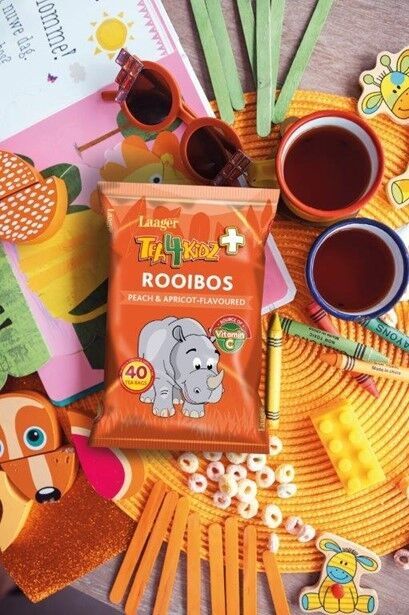Renowned dietitian shares 6 diet tweaks to help manage ADHD
Written by: Olivia Jones communications Save to Instapaper
Attention Deficit Hyperactivity Disorder (ADHD) is one of the most commonly occurring disorders affecting South African children and adolescents, and while it is treated with medication and other interventions, studies show that diet can also influence ADHD symptoms. To assist in managing these symptoms, Laager Tea4Kidz partner dietitian, Mbali Mapholi, has shared six dietary tips for children with ADHD.
“ADHD is a neurodevelopmental condition characterised by inattention, hyperactivity, and impulsivity,” explained Mapholi. “While the exact cause is complex and not fully understood, ongoing research explores the relationship between diet and ADHD symptoms.”
She said that, while no child is the same, some studies are suggesting that nutrient deficiencies, dietary patterns, food sensitivities, and blood sugar levels may influence ADHD symptoms.
“For example, addressing deficiencies in vitamins and minerals, avoiding potential trigger foods, and maintaining stable blood sugar levels through a balanced diet are important. However, it's crucial to approach dietary changes cautiously and in collaboration with a dietitian, as they should complement, not replace, evidence-based treatments like behavioural interventions or medication when necessary.”
Mbali Mapholi’s 6 dietary tips for ADHD
“Managing the diet of a child with ADHD involves making thoughtful and strategic choices to support their overall well-being. While there is no one-size-fits-all solution, here are some practical improvements you can consider,” she explained.
1. Varied diet
Ensure your child receives a diet with a variety of fruits, vegetables, whole grains, lean proteins, and healthy fats.
Tip: Treats should not replace snacks. Limit processed foods, sugary snacks, and carbonated drinks, as these can contribute to rapid energy spikes and crashes if consumed as treats.
2. Omega-3 fatty acids
Include foods rich in omega-3 fatty acids, such as fatty fish like pilchards and smoked salmon, seeds like flaxseeds and chia seeds, and nuts like walnuts.
Tip: Try delicious, quick smoothie recipes that the child will love, incorporating seeds. Alternatively, cook pilchards pasta, a kid-friendly meal that boosts omega-3 intake.
3. Protein-rich foods
Include protein in each meal from sources like lean meats, poultry, fish, eggs, dairy, legumes, and nuts.
Tip: Add chicken strips/nuggets, boiled eggs, yoghurts, nuts, and nut butter into their diet in small manageable quantities throughout the day.
4. Avoid caffeine and sugary beverages
Limit caffeine intake as excessive caffeine can contribute to restlessness and affect sleep. There are no clear caffeine recommendations for children and teenagers so it is recommended that they should not consume caffeine. Ensure your child stays hydrated by drinking enough water throughout the day as dehydration can affect cognitive function.
Tip: Add Laager Rooibos tea which is caffeine-free and naturally sugar-free, as a versatile beverage served hot or in delicious homemade Rooibos tea. You can add fruits and herbs to the tea. Laager Tea4Kidz has a range of delicious flavours that appeal to children.
5. Iron-rich foods
Include iron-rich foods like lean meats, beans, lentils, and fortified cereals as iron is important for cognitive function.
Tip: Incorporate canned red kidney beans in wraps, start the day with a bowl of fortified cereal with milk and a side of fruit, or add lentils to pasta dishes like bolognese or sloppy joes. The key is in serving these foods and allowing the child to share how they like their food served & cut.
6. Regular meals and snacks
Children with ADHD may struggle with getting through large quantities of food, so aim for regular meals and snacks to keep blood sugar levels stable, preventing energy crashes that may affect attention and mood.
Tip: During mealtimes, offer food before a drink; for example, during breakfast, offer breakfast first and then, when the child is satisfied, encourage them to have their Laager Rooibos tea.
Laager Rooibos and Laager Tea4Kidz are available in a range of delicious flavours. For a range of healthy recipes, advice and tips visit www.joekels.co.za, or @LaagerRooibosTea on Facebook and Instagram. For more insightful dietary information, follow Mbali Mapholi @Urbandietitian on Instagram.
Latest from
- Crocworld Celebrates Its Incredible Women in Conservation
- How the KZN South Coast is the Ultimate Base for Digital Nomads
- Record Number of Coffee Professionals Gather in Durban for Creative Coffee Week
- Tips for Keeping Your Feet Healthy in Closed Shoes This Winter
- Wild Alliance Africa Celebrates MPA Day on KZN South Coast
- Help Get the Run for Rangers Team Over the R700k Mark!
- 6 Ways Chamomile Tea Supports Health and Natural Ageing
- Crocworld Conservation Centre Shares 9 Fascinating Facts About Its Crocodiles
- Community Garden and Micro-Farming Initiatives Cultivate Growth and Opportunity on the KZN South Coast
- Crocworld Conservation Centre Hands Over Donation to CROW in Support of Wildlife Rehabilitation
- Celebrate the Ocean with These Unmissable MPA Day Events Hosted Across South Africa – and the World!
- The Benefits of Multi-Generational Living in Residential Estates
- Find Your Way Around South Africa’s MPAs With the Launch of the MPA Maps!
- Action-Packed Events Line-up Announced for Packshed Restaurant in Serenity Hills
- Get ready for the buzz - and we don’t just mean the caffeine
The Pulse Latest Articles
- Steinmüller Africa - 14 Rigger Apprentices Achieve Red Seal Certification (August 20, 2025)
- Designed To Inspire_the Raindance Alive Experience (August 18, 2025)
- Zintle Mpupha’s World Cup Mindset, Prepared For The Big Stage (August 18, 2025)
- Hansgrohe Reinvents The Washbasin With Avalegra (August 15, 2025)
- From Tiktok To The Karoo: New SA Initiative Reclaims Manhood Through Wilderness (August 14, 2025)
